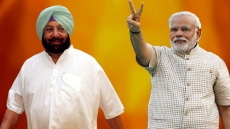Delhi Chief Minister Arvind Kejriwal on Monday announced the beginning of installation of 2.1 lakh street lights in the city, saying the move will eliminate dark spots and enhance women's safety.
He had announced the scheme Mukhyamantri Street Light Yojana in September.
"The street light installation under the scheme is beginning today. We have worked hard in the last two months to fulfil all the procedural requirements for spearheading the installation process," Mr Kejriwal said.
Under the scheme, 2.10 lakh street lights are being installed across Delhi.
"A major problem that existed was that of dark and dimly lit spots in the city. We have already identified the dark spots where street lights are necessary," he said.
SafetiPin, an NGO working on the safety and security of women, submitted its first report to the Delhi government in 2016, after carrying out a safety audit and identifying 7,438 dark spots across the city.
The government has worked on lighting these dark spots in the last three years, and the number of dark spots which were identified in another audit carried out by SafetiPin over January to May 2019 was 2,768 in number, he said.
The dark spots, in a period of two years, were reduced by 4,670 or 63 per cent.
"The biggest problem we faced in eliminating them is the lack of consent/approval from MCDs in installing poles and street lights on their streets. This innovative scheme bypasses the role of the MCD and provides a direct solution to people's problems of dark spots," he added.
The Aam Aadmi Party chief said every MLA is coordinating with the people of their constituencies and the remaining dark spots will be eliminated soon.
Citizens are also being asked to submit suggestions for street lights to their MLAs, just like the government had done in the case of installing CCTVs.
"We encourage all the people of Delhi to participate in identifying locations that need better lighting. Women's safety is our priority and we will install as many street lights and use as many resources as possible to ensure the security of women in the city," he added.
The government has devised a system wherein the installed street light will obtain power from the household connection of the building owners and the amount levied on the units consumed by street lights will be deducted and paid for by the Delhi government, he said.
"These street lights are automatic and remotely controlled with a cloud-based sensor. They will automatically turn on when it is dark and will stop when the sun rises in the morning," he said.
He stressed that till the end of January, 50,000 to 60,000 street lights will be installed across Delhi and the installation work will be completed within four months.
"The installation of the CCTV cameras has made a positive impact in the city and the installation of the street lights will further ensure that Delhi remains safe," he said.
Till now 1.4 lakh CCTV cameras have been installed and 1.4 lakh more are in the process of being installed.
PWD Minister Satyendar Jain said street lights will be installed on poles in commercial areas and at main roads.
Apart from residential buildings, street lights will be installed in commercial buildings, where poles cannot be erected in the city's congested areas.
"This is a standard practice in many western countries," Mr Jain said.

